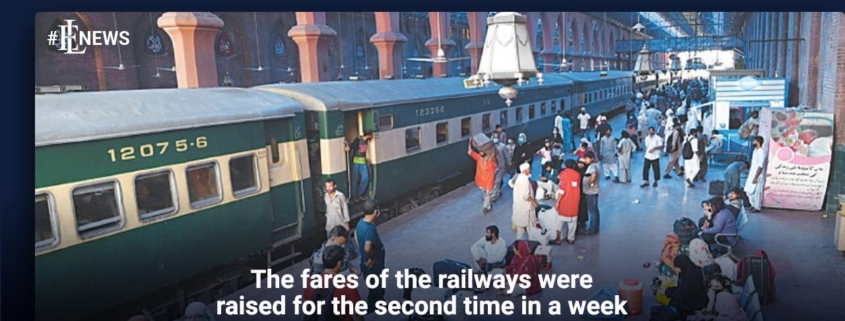The fares of the railways were raised for the second time in a week
The fares of the railways were raised for the second time in a week. The Pakistan Railways (PR) is likely to raise the prices of express and goods trains again on June 21. This is because the prices of oil products have been going up over and over again.
Read more with EL news: CDA will invest PKR 100 million on jogging tracks in the capital city
Dawn has learned that there are no plans to raise prices for people taking local passenger trains on short-distance routes that start at different stations around the country.
“On Saturday, at a high-level meeting, it was decided in principle to raise the prices of all express and mail trains by 5% and freight trains by 10%. An official told Dawn that the new prices are likely to go into effect on June 21 (Tuesday). “It’s because the government raised the price of oil,” the official said, asking not to be named.
The PR had already raised the prices of all express passenger trains by 10% and freight charges for all goods trains by 15% on June 14. This was done in response to rising oil prices and other financial problems. But it dropped the idea of raising the prices of local passenger trains to help a lot of workers, labourers, salaried class, and other people who take these trains to work in different cities.
According to the minister of railways, the organisation is taking a huge financial hit of Rs8 billion because oil prices are going up. This can’t be fixed without raising fares and freight charges. Khwaja Saad Rafique said at a press conference on June 14: “Since we have no other choice, we have decided to raise the prices of all express passenger trains by 10% and freight trains by 15%.”
He criticised the Pakistan Tehreek-i-Insaf government for doing a lot of damage to the PR, which he said was making money when the PML-N was in power from 2013 to 2018.
According to reports, the PR needs more than 1.5 million litres of oil (diesel) worth Rs20 billion every year to run its passenger and freight trains. This is 30 percent of the total cost of running the PR. Around 70 million people travel by train every year, and many freight companies use it to move their goods. There are 15 places where the fuel tanks of locomotives can be filled.
The PR had previously had a third party evaluate or audit the above-mentioned sites and found several holes or leaks that were costing it around Rs1.5bn in revenue. There were old fuel storage tanks, no modern fuel dispensers, bad calibration, fuel theft and waste, and no system that was based on performance and technology.
On May 16, the PR and the PSO signed an agreement that said the PR would rent out its different pieces of land to the PSO so that it could set up or update the storage facility to make sure oil supplies were always on time. The PR had rented out some of its land to the PSO earlier in 1982. The PSO continued to use this land to store oil for the PR.
Later, a fight broke out between the two state-owned companies, and the land agreement hasn’t been signed or extended since 2018. After some problems were solved, the legal teams of both organisations worked together to write the new agreement. One site was rented in Akora Khattak, Kundian, Sargodha, Gujranwala, Sahiwal, Mahmoodkot, and Hyderabad, and two sites were rented in Kot Lakhpat, Faisalabad, Badami Bagh, and Vehari. Starting on June 30, 2018, the sites were rented out for six years.
Keep up with Estate Land Marketing for news and updates.




Leave a Reply
Want to join the discussion?Feel free to contribute!